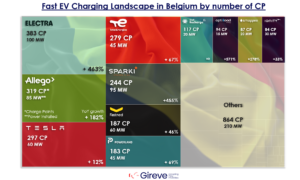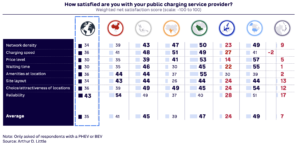The Role of Charging Stations
These charging facilities are instrumental in the broader shift towards more environmentally friendly transportation methods. However, the report uncovers that a major portion of the operational costs for these stations extends beyond mere electricity consumption to include network costs — essentially, the fees levied for grid usage. Surprisingly, these costs exhibit wide variations not just across different European Union (EU) Member States but also within individual countries, leading to stark differences in charging fees at sites, particularly at those situated near border crossings.
Case Studies: Cross-Border Cost Variations
The report highlights several instances where these cost discrepancies become evident. For example, the difference in grid fees between Poland and Germany means that charging a 500-kilowatt-hour electric truck can be around EUR 13 cheaper in Poland than in Germany. Other notable discrepancies are seen at the Austria-Italy border, the Netherlands-Germany boundary, and between Belgium and Luxembourg. Such differences could potentially foster a trend of ‘charging tourism,’ where fleet operators may opt for charging locations based on cost considerations, thereby impacting grid efficiency and increasing overall system costs.
The Concept of Charging Tourism
Charging tourism, reminiscent of the ‘petrol tourism’ observed with diesel trucks due to fuel tax disparities, carries implications that extend beyond mere financial considerations. It poses potential challenges for local power grids and may lead to the uneven development of charging infrastructure.
Policy Recommendations for Harmonisation
To counteract these challenges, the report underscores the necessity for coordinated policy measures across the EU. It advocates for network prices to more accurately reflect the actual costs incurred, suggesting a move towards volumetric time-of-use pricing. Such a shift could significantly reduce operational costs for charging sites, especially those with low utilisation rates, and would be particularly beneficial during the initial phases of infrastructure rollout. Furthermore, the report suggests that harmonising taxes and levies on truck charging between Member States could mitigate large price disparities, promoting a more competitive market for truck charging services.
Looking Ahead
The findings of this report point to the urgent need for a strategic and coordinated approach to the development and pricing of electric truck charging infrastructure across Europe. By addressing the highlighted disparities and adopting recommended policy measures, European nations can pave the way for a more efficient, equitable, and sustainable freight transportation sector. As the continent continues to advance towards cleaner transportation solutions, the insights from this report offer valuable guidance for policymakers, planners, and operators in the charging infrastructure domain.
Source: Cost Analysis of Megawatt Charging in Europe | RAP




